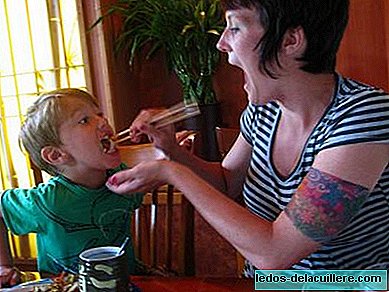
The Thao Foundation and the DKV Institute, have recently carried out research cradle called “Study of the environment during mealtime in childhood”, which has consisted of direct observation of 40 families with 52 children aged three to seven years.
I remember that when we presented Thao's last work, reporting that childhood obesity rates were being maintained, I read something about the future study I present to you today, and I found it interesting to have an overview of family behavior at the time of eat.
Interesting, because although it seems an intrusion (agreed, of course) in privacy, the technique has been used to deepen the educational and cultural factors that children inside the family
In my humble (and partial) opinion, many children are overwhelmed - "finish the plate!", "Don't play with the spoon!", Etc. - just at a time when the whole family should be relaxed. As I was talking to Julio Basulto (in this interview), many times parents tend to forget about the importance of nutrition to pressure children on unimportant issues.
And that although it is known that eating as a family can become a factor of protection against various eating disorders; and it is even considered as a powerful mechanism to reinforce family communications, to the point that its relationship with academic performance is possible. But of course, a meal in which they fight each other, answer badly, eat in disgust, or want to finish getting up from the table; that does not exercise the benefits attributed to it.
But, let's go back to the study: family interactions at mealtime have been studied, collecting strategies that fathers and mothers use to influence the behavior of sons and daughters while they eat, and the response of boys and girls, within the context of mealtime.

This time the "what they eat" was not the main concern
But, as mentioned, family dynamics; since these are so important that they influence the family environment. Let's keep in mind that The longer the “meal time”, the greater the interaction with children, establishing a positive environment that focuses on listening to children, and holding different conversations on topics of general interest.
Thus, for example, meals that last less than twenty minutes are related to children who eat only with the presence of one of the parents, who generally focus on behavior and manners.
On the other hand, when the act of eating is done with toys or watching TV (something very inadvisable in my opinion), increases the child's own dispersion, establishing a kind of struggle between "eating" and "having fun." It is an erroneous belief to think that the stimuli / food set can give good results, because it does not facilitate a good relationship with food at all, let alone with the family.
It seems that when there are no elements of distraction at the table, and parents interact with their children, children are less distracted and focus on food (My partner would love to read this because he never tires of asking the girl not to bring her dolls or small treasures to the table, which also take up space in the small table).
Taking into account the results of the observations
Parents are reminded that children have an innate ability to regulate energy intake, that translated would be that by not putting insane food within reach, parents should be calm about those spoonfuls of more or less (and regulate what we put in the dish based on the knowledge of our own children).
Parents who maintain a conversational model (non-directive, therefore) often show more respect towards children's attitudes, and achieve better results. I understand that this model is the result of the confidence that parents feel in themselves, and confidence in their children, and it would be a goal to achieve. Let's start by practicing listening, and stop being those "talking heads" who chatter incessantly, ignoring the little ones (who are not mini-people because they are).
There must be a respect for the dynamics of the children, their rhythms, perceptions and sensations during the meal: animation, negotiation and acceptance, are more than adequate strategies, as well as positive interpellation (Curiously, this is related to education through questions we will talk about this afternoon).
Obviously, parents can have a bad day, or we can get angry because children play to throw macaroni at each other (it's an exaggeration, maybe you have more truthful examples :)); but in general we should dramatize, and focus on the important, without exempting them from asking the little ones for mutual respect.
For dessert: dessert
To finalize the recommendations, and put the “icing”, comment that the dessert it is nothing but a food integrated in the food, which I understand that according to cultures, it could even be expendable. But I don't put myself in Rottenmeier's plan, that at home we do have dessert, although it is not the goal of the meal; The question is not that, but the fact that if we use it as a reward, we disassociate it from food, and the child does not internalize any positive value.
In the observed families it appeared as a playful element, for negotiation and even as a threat. And the great opportunity for children to enjoy the textures and flavors of foods considered desserts is not lost, instead of swallowing with gluttony because it is considered a reward?
By the way, although the study does not consider nutritional aspects, remind you that in general, much better fruits as dessert
In general, during the meal, children should have the opportunity to develop your own tastes and experiment with new flavors.
Images | eyeliam, Bruce Tuten
Via | Navarra's Diary
More information | DKV Insurance
In Peques and More | It is your responsibility: start to introduce changes in food and lifestyles to prevent childhood obesity, Education of children in food: distribution of meals and behavior at the table, do you pay attention to the children's menu when you go to eat out From home?












